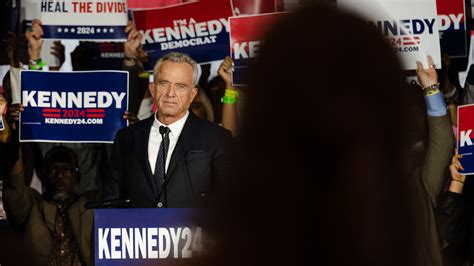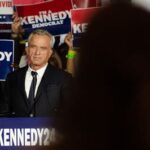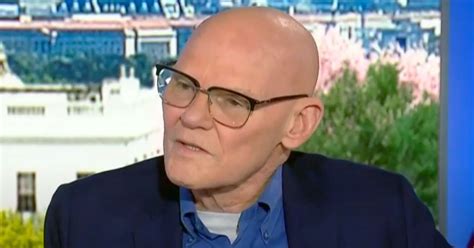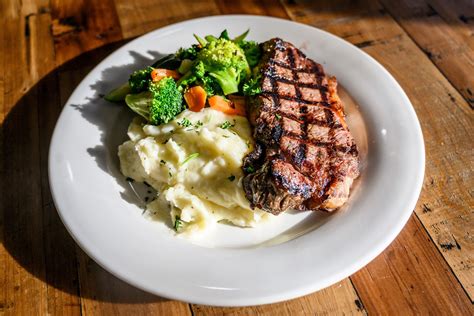
The spread of conspiracy theories surrounding John F. Kennedy Jr., particularly the notion that he is still alive and will reappear to support certain political figures, poses a potential threat of violence, according to Democratic strategist James Carville.
Veteran Democratic strategist James Carville has warned that the persistence of conspiracy theories surrounding the late John F. Kennedy Jr. could incite violence. Carville specifically addressed the fringe belief that JFK Jr., who died in a plane crash in 1999, is secretly alive and will reappear as a political savior. He made these remarks during an appearance on MSNBC’s “The Katie Phang Show” on Saturday.
“These people are capable of anything. They are, and they’re gonna hurt somebody,” Carville stated, expressing deep concern about the potential real-world consequences of such unfounded beliefs. He pointed to instances of political violence, such as the attack on Paul Pelosi, as evidence of the dangers posed by individuals who subscribe to extremist conspiracy theories. “I’m telling you, this stuff is deadly serious.”
Carville’s warning comes amid the resurfacing and amplification of QAnon-adjacent theories that JFK Jr. will emerge to support Donald Trump or other figures aligned with the far-right. These theories often intertwine with broader narratives of a “deep state” and a fight against perceived enemies of the people. Carville emphasized the urgency of taking these beliefs seriously, especially given the current polarized political climate. He characterized the belief that JFK Jr. is still alive as “mind-boggling” and indicative of a dangerous disconnect from reality.
“The idea that John F. Kennedy Jr. is going to come back — I mean, it’s mind-boggling. But these people are serious, and they are dangerous, and we should treat them with that kind of seriousness,” Carville said. He did not mention specific individuals or groups promoting these theories, but his remarks underscore a broader concern about the mainstreaming of conspiracy thinking and its potential to inspire acts of violence.
Carville’s comments reflect a growing concern within political and media circles about the impact of conspiracy theories on American society. The spread of misinformation and disinformation has been identified as a significant threat to democracy, contributing to political polarization, distrust in institutions, and even real-world violence. The persistence of the JFK Jr. conspiracy theories, despite the overwhelming evidence of his death, highlights the challenges of combating these false narratives.
The theories surrounding JFK Jr. often find fertile ground within the QAnon community, a sprawling network of online conspiracy theorists who believe in a cabal of Satan-worshipping elites who control the world. QAnon followers often await cryptic messages from an anonymous online persona known as “Q,” who they believe is a high-ranking government official. The JFK Jr. theories fit into this broader worldview, providing a narrative of hope and salvation for those who believe in QAnon’s prophecies.
The enduring appeal of the JFK Jr. conspiracy theories may stem from a variety of factors, including nostalgia for a bygone era, a desire for simple explanations in a complex world, and a deep distrust of mainstream media and political institutions. For some, the belief that JFK Jr. is still alive offers a sense of hope that the country can be “saved” from its current problems. For others, it provides a sense of belonging and community within the QAnon movement.
However, experts warn that these theories can have serious consequences. They can lead to radicalization, social isolation, and even violence. The attack on the U.S. Capitol on January 6, 2021, served as a stark reminder of the dangers of conspiracy theories and their potential to incite political unrest. Many of those who participated in the attack were motivated by QAnon beliefs and other false narratives.
Carville’s warning about the JFK Jr. conspiracy theories should be seen in this context. It is a reminder that words and beliefs have consequences, and that the spread of misinformation and disinformation can have a devastating impact on individuals and society as a whole. The challenge is to find effective ways to combat these false narratives without infringing on freedom of speech or further polarizing the political landscape. This requires a multi-faceted approach that includes media literacy education, fact-checking initiatives, and efforts to address the underlying social and economic factors that contribute to the appeal of conspiracy theories. It also requires political and community leaders to speak out against these theories and to promote a more reasoned and evidence-based public discourse.
Expanded Context and Analysis:
The persistence of the JFK Jr. conspiracy theories is particularly striking given the overwhelming evidence of his death. John F. Kennedy Jr., his wife Carolyn Bessette-Kennedy, and her sister Lauren Bessette died on July 16, 1999, when the plane he was piloting crashed into the Atlantic Ocean off the coast of Martha’s Vineyard. The National Transportation Safety Board (NTSB) determined that the crash was likely caused by pilot error, specifically Kennedy’s failure to maintain control of the aircraft during a night flight over water.
Despite this clear and well-documented explanation, the JFK Jr. conspiracy theories have continued to circulate for more than two decades. These theories often claim that Kennedy faked his own death to escape the public eye or to embark on a secret mission. Some versions of the theory claim that he is working undercover to expose a criminal cabal or that he will return to lead a political movement.
The resurgence of these theories in recent years is closely linked to the rise of QAnon and other far-right movements. QAnon followers often view Kennedy as a symbol of hope and a potential savior figure. They believe that he will return to expose the “deep state” and help restore the country to its former glory.
The intertwining of the JFK Jr. conspiracy theories with QAnon has created a particularly potent and dangerous mix. QAnon followers are often highly motivated and deeply committed to their beliefs. They are willing to take extreme measures to defend their worldview, as evidenced by the January 6th Capitol attack.
The spread of these theories is further fueled by social media platforms, which provide a fertile ground for misinformation and disinformation. Conspiracy theories can quickly spread virally online, reaching a large audience in a short amount of time. Social media algorithms can also reinforce these beliefs by showing users content that aligns with their existing views, creating echo chambers and reinforcing confirmation bias.
The challenge of combating the JFK Jr. conspiracy theories and other forms of misinformation is significant. Simply debunking these theories with facts and evidence is often not enough. Conspiracy theorists are often resistant to evidence that contradicts their beliefs, and they may even interpret such evidence as further proof of the conspiracy.
A more effective approach may involve addressing the underlying social and psychological factors that contribute to the appeal of conspiracy theories. These factors include distrust in institutions, feelings of alienation and powerlessness, and a desire for simple explanations in a complex world.
Media literacy education is also crucial. People need to be taught how to critically evaluate information and identify misinformation. This includes learning how to distinguish between credible and unreliable sources, how to identify logical fallacies, and how to recognize the signs of propaganda.
Furthermore, social media companies need to take greater responsibility for the content that is shared on their platforms. This includes removing misinformation and disinformation, labeling false or misleading content, and promoting credible sources of information.
Finally, political and community leaders need to speak out against conspiracy theories and to promote a more reasoned and evidence-based public discourse. This requires courage and a willingness to challenge false narratives, even when they are popular or politically expedient.
Carville’s warning about the JFK Jr. conspiracy theories is a call to action. It is a reminder that the spread of misinformation and disinformation is a serious threat to democracy and that we all have a responsibility to combat it. By taking a multi-faceted approach that addresses the underlying causes of conspiracy theories, promotes media literacy, and holds social media companies accountable, we can help to create a more informed and resilient society.
The enduring appeal of the JFK Jr. conspiracy theories also speaks to a deeper yearning for hope and leadership in a time of uncertainty. John F. Kennedy Jr. was seen by many as a charismatic and promising figure who could have potentially played a significant role in American politics. His untimely death left a void that some people are still trying to fill.
The theories surrounding his alleged survival tap into this sense of loss and longing. They offer a narrative of hope that Kennedy will return to lead the country out of its current problems. This narrative is particularly appealing to those who feel disillusioned with the political establishment and who are searching for a savior figure.
However, it is important to recognize that these theories are based on fantasy, not reality. They offer a false sense of hope and can lead to dangerous consequences. It is essential to ground ourselves in reality and to focus on addressing the challenges facing our country through rational and evidence-based means.
Impact on American Society
The resurgence of JFK Jr. conspiracy theories, amplified by the digital age, poses a tangible threat to the stability of American society. These theories, particularly when intertwined with QAnon ideologies, contribute to a broader climate of distrust and division, eroding faith in institutions and fostering animosity towards those with differing beliefs.
The impact manifests across multiple levels:
-
Erosion of Trust: Conspiracy theories inherently undermine trust in established authorities, including government, media, and scientific institutions. When individuals believe that these entities are engaged in widespread deception, it becomes difficult to engage in rational discourse or find common ground on critical issues. The result is a polarized society where facts are contested and evidence is dismissed based on pre-conceived notions.
-
Political Polarization: These theories often align with extreme political ideologies, further exacerbating political divides. The belief that JFK Jr. will return to support a particular political figure or movement reinforces existing biases and creates a sense of urgency among believers, leading to increased political activism and, in some cases, radicalization.
-
Incitement to Violence: As James Carville emphasized, conspiracy theories can have real-world consequences, including inciting violence. When individuals believe that they are fighting against an evil force, they may be more likely to resort to extreme measures, including violence, to achieve their goals. The attack on the U.S. Capitol on January 6th serves as a stark reminder of the potential for conspiracy theories to incite political unrest and violence.
-
Social Fragmentation: These theories can isolate individuals from mainstream society, as they become increasingly entrenched in online communities that reinforce their beliefs. This can lead to social isolation and a loss of connection with friends and family who do not share their views.
-
Mental Health Concerns: Engaging with conspiracy theories can also have negative impacts on mental health. The constant exposure to misinformation and fear-mongering can lead to anxiety, depression, and other mental health problems.
-
Hindrance to Problem-Solving: The belief in conspiracy theories can hinder effective problem-solving. When individuals are focused on uncovering hidden plots and conspiracies, they may be less likely to engage in rational analysis of complex issues or to support evidence-based solutions.
Combating the Spread of Conspiracy Theories
Addressing the spread of JFK Jr. conspiracy theories and other forms of misinformation requires a multifaceted approach that targets both the supply and demand sides of the problem.
Supply-Side Interventions:
-
Regulation of Social Media Platforms: Social media companies need to take greater responsibility for the content that is shared on their platforms. This includes removing misinformation and disinformation, labeling false or misleading content, and promoting credible sources of information.
-
Fact-Checking Initiatives: Independent fact-checking organizations play a crucial role in debunking conspiracy theories and providing accurate information to the public. These organizations need to be supported and expanded to reach a wider audience.
-
Media Literacy Education: Media literacy education should be integrated into school curricula to teach students how to critically evaluate information and identify misinformation.
Demand-Side Interventions:
-
Addressing Social and Economic Inequality: Conspiracy theories often thrive in communities that are experiencing social and economic hardship. Addressing these underlying issues can help to reduce the appeal of conspiracy theories.
-
Promoting Critical Thinking Skills: Encouraging critical thinking skills can help individuals to resist the lure of conspiracy theories. This includes teaching people how to identify logical fallacies, how to evaluate evidence, and how to consider alternative perspectives.
-
Building Trust in Institutions: Restoring trust in institutions is essential for combating conspiracy theories. This requires greater transparency, accountability, and responsiveness from government, media, and other institutions.
-
Promoting Social Cohesion: Building social cohesion can help to reduce polarization and create a more inclusive society. This includes promoting dialogue across different groups, celebrating diversity, and fostering a sense of shared identity.
The Role of Education and Critical Thinking:
Education plays a pivotal role in inoculating individuals against the allure of conspiracy theories. Media literacy programs should be implemented in schools and communities to equip citizens with the skills to critically analyze information, identify biases, and evaluate the credibility of sources. These programs should emphasize:
- Source Evaluation: Teaching individuals how to assess the credibility and reliability of sources of information, including websites, social media accounts, and news organizations.
- Bias Detection: Helping individuals recognize and understand the different types of biases that can influence the presentation of information.
- Logical Fallacies: Educating individuals about common logical fallacies that are often used in conspiracy theories, such as ad hominem attacks, straw man arguments, and false dilemmas.
- Fact-Checking Techniques: Providing individuals with the tools and resources to verify information and identify misinformation.
Critical thinking skills are essential for evaluating claims and arguments, identifying weaknesses in reasoning, and forming independent judgments. Educational initiatives should promote the development of these skills through activities that encourage questioning, analysis, and problem-solving.
The Importance of Dialogue and Empathy:
Combating conspiracy theories also requires a commitment to dialogue and empathy. Engaging in respectful conversations with individuals who hold conspiracy beliefs can help to build bridges and foster understanding. It is important to listen to their concerns, acknowledge their feelings, and avoid resorting to dismissive or judgmental language.
Empathy is crucial for understanding why individuals are drawn to conspiracy theories. Often, these theories provide a sense of control, belonging, or meaning in a world that feels chaotic and uncertain. By understanding these underlying motivations, it becomes possible to address the root causes of conspiracy thinking and offer alternative sources of support and connection.
However, it is also important to set boundaries and avoid engaging in endless debates that are unlikely to change anyone’s mind. The goal is not necessarily to convince someone to abandon their beliefs, but rather to create a space for respectful dialogue and to plant seeds of doubt that may eventually lead them to question their assumptions.
The Need for Leadership and Responsibility:
Political, community, and media leaders have a responsibility to speak out against conspiracy theories and to promote a more reasoned and evidence-based public discourse. This requires courage and a willingness to challenge false narratives, even when they are popular or politically expedient.
Leaders should model responsible behavior by:
- Promoting Accurate Information: Sharing accurate and verified information with the public and correcting misinformation when it is encountered.
- Condemning Conspiracy Theories: Publicly denouncing conspiracy theories and explaining why they are harmful.
- Fostering Civil Dialogue: Encouraging respectful dialogue and debate on important issues.
- Holding Themselves Accountable: Being transparent and accountable for their own statements and actions.
The fight against conspiracy theories is a long-term endeavor that requires a collective effort from individuals, communities, institutions, and leaders. By working together, we can create a more informed, resilient, and cohesive society that is less susceptible to the allure of misinformation and disinformation.
FAQ: Frequently Asked Questions about the JFK Jr. Conspiracy Theories
-
What are the JFK Jr. conspiracy theories?
The JFK Jr. conspiracy theories are a set of beliefs that claim John F. Kennedy Jr., his wife Carolyn Bessette-Kennedy, and her sister Lauren Bessette did not die in a plane crash in 1999, and that JFK Jr. is still alive and will reappear to support certain political figures or movements. These theories often intertwine with QAnon narratives.
-
What is James Carville’s concern about these theories?
James Carville, a Democratic strategist, is concerned that the persistence and spread of these conspiracy theories could incite violence. He believes that individuals who subscribe to these unfounded beliefs are capable of harmful actions, citing past instances of political violence.
-
What is the connection between JFK Jr. conspiracy theories and QAnon?
The JFK Jr. conspiracy theories have found a significant following within the QAnon community. QAnon followers often view JFK Jr. as a potential savior figure who will return to expose the “deep state” and help restore the country.
-
What are the potential dangers of believing in conspiracy theories?
Believing in conspiracy theories can lead to radicalization, social isolation, distrust in institutions, and even violence. The spread of misinformation can have a devastating impact on individuals and society as a whole, contributing to political polarization and undermining democracy.
-
What can be done to combat the spread of these theories?
Combating the spread of conspiracy theories requires a multi-faceted approach, including media literacy education, fact-checking initiatives, regulation of social media platforms, and efforts to address the underlying social and economic factors that contribute to their appeal. It also requires political and community leaders to speak out against these theories and promote a more reasoned and evidence-based public discourse.









